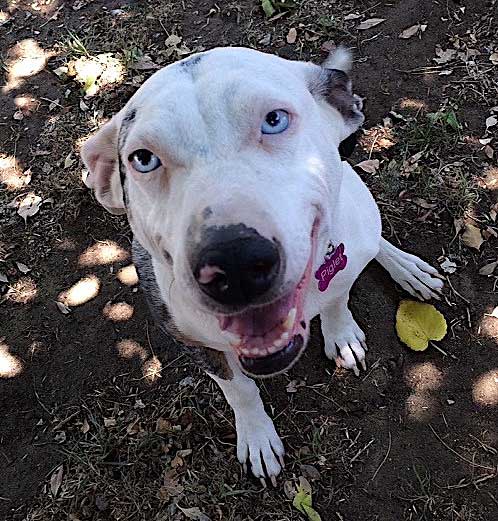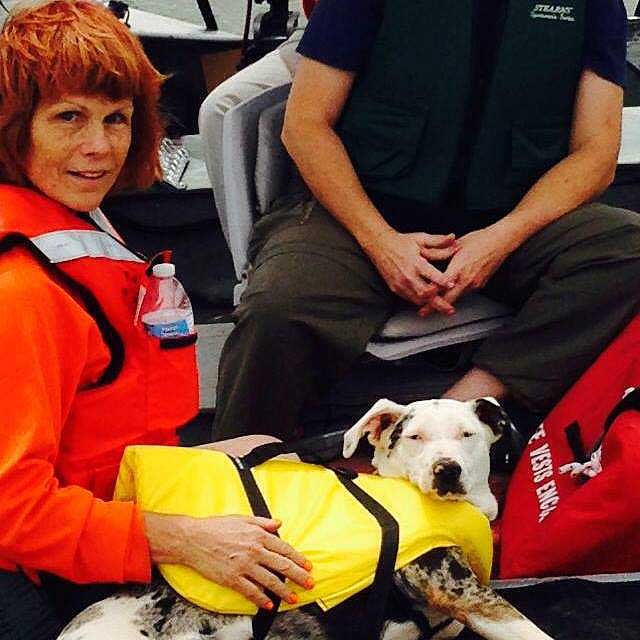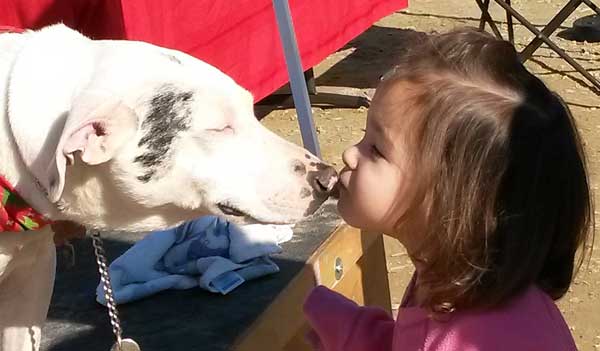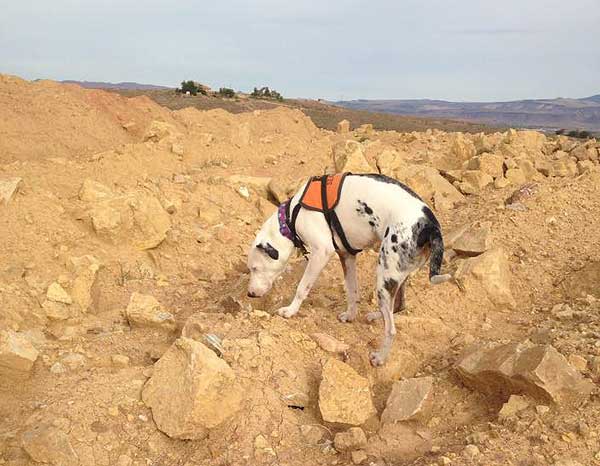
Lori Wells, of Lancaster, Calif., and her search-and-rescue partner, Piglet, take a break during a deployment in the Las Vegas area.
This is the second of a series of features on 2017’s AKC Humane Fund Awards for Canine Excellence Winners.
There is nothing about the name “Piglet” or “Catahoula Leopard Dog” that would suggest an intoxicating blend of laughter or tears. The laughter is inspired by her infections smile. The tears refer to the sadness of families due to the loss of a loved one and the comfort she provides them.
The laughter and the tears reflect the Southern California 6-year-old dog’s ability to embrace challenges in environments ranging from remote mountain terrain, to bodies of water and parched sandy deserts, to banquet halls.
And that’s why this 44-pound, blue-and-white leopard-patterned whiz and her owner, Lori Wells, of Lancaster, Calif., are being recognized for their search and rescue prowess. They are winners of an Awards for Canine Excellence (ACE), and will be recognized at the AKC National Championship presented by Royal Canin in Orlando, Fla., Dec. 16-17.
So what’s the story behind the name “Piglet”?
A bemused Wells explains, “As a puppy, she was quite white and pink. I thought that she looked like a baby pig. Her actual name is ‘Porcelet,’ which means little pig in French.” This name honors the Cajun heritage in her breed’s home state of Louisiana, where, in 1979, the breed was recognized as the official state dog.

The 6-year-old Catahoula Leopard Dog shows off her “infectious smile” for the camera.
They are sometimes called Catahoula curs, Catahoula leopard curs, or Catahoula hounds, but the name was officially changed to Louisiana Catahoula Leopard Dog when the breed became recognized as the official state dog. The name derives from the Indian word meaning “clear water’; the breed originated in Northern Louisiana’s Catahoula Parish near Catahoula Lake.
When Wells and Piglet arrive on a search scene, they sometimes draw curious looks from law-enforcement officials accustomed to seeing German Shepherd Dogs, Belgian Malinois, Australian Shepherds, Australian Cattle Dogs, Border Collies, Bloodhounds, Golden Retrievers, and Labrador Retrievers on search and rescue assignments.
Wells, who has owned Catahoulas for 18 years (Piglet is her third), is effusive about this Human Remains Detection Dog’s work ethic and versatility. “She is a natural. I sensed she was special when I began training her at 3 months of age, and she has continued to blossom. She was inquisitive from the get-go, yet would sit back and watch the other dogs interact, as if she was sizing up the situation.”
Piglet has always been a quick learner and does not like repetition, Wells laughs. “From her standpoint, she’s got it and is ready to move on.”
One of Piglet’s chief attributes, adds the owner/trainer, is her “willful disobedience.” Yes, that’s right! “When I head in one direction on-site, and she wants to go another, she is telling me that’s where our target is. You want that in a search dog. She’s kinda saying, ‚ÄòWhat is that stupid human thinking?’ It comes down to trusting your dog.”

Wells and Piglet get ready to head out into the field at Lake Perris, in Riverside County, Calif.
Piglet, the first off-lead working dog Wells has certified, sometimes works at distances of 30 yards from her human partner.
As a trainer/owner, Wells prefers the safety aspect of always having control of the leash, particularly in potentially dangerous environments — from swirling rivers to challenging sites covered with cactus, shale, and environmental hazards, where she places booties on Piglet before proceeding.
A rehearsal actor and part-time cat groomer, Wells has only been called out to deploy once from each job. “Having a supportive workplace is helpful,” she emphasizes. In addition to those workloads, she typically trains with Piglet once or twice each week, usually traveling 1¬Ω-to-2 hours each way.
Piglet’s magnetism is is recognized in the field and also at community events in California, Nevada, Arizona, and Utah, where she is an ambassador for search and rescue. That’s where her “infectious smile” kicks in. “Everyone wants to meet her, and all ask what breed she is. At that point, I give them a quick primer on her Louisiana heritage,” says Wells.
Because she has an engaging personality, many of those in attendance long for a kiss from the Pig – and a selfie, too. And she is usually happy to oblige.

The fun-loving Catahoula gives one of her famous kisses to a young girl at a public-relations event in Burbank, Calif.
Wells is not consumed with notching a specific number of finds in Piglet’s resum√©. A lot of her work is simply clearing and helping rule out areas where there are no remains.
To end an outing on an upbeat note after no remains are found, Wells will bring Piglet home and hide a training aid on the one-acre property she and her husband, Robert, own, and then send Piglet out to uncover it. “She’s a happy camper then,” says Wells.
She recalls a couple of particularly fulfilling outings.
“We responded in a remote wilderness area at Mount Charleston, Nev., near Las Vegas, for a missing person. Our trailing dogs were first utilized to establish a ‚Äòdirection of travel,’ including verifying where the scent of the missing person was or wasn’t. After the probable location was identified, Piglet was sent in with a team of ‘ground pounders.’ Pretty quickly, she caught the scent and directed the search effort. We followed and found the missing person.”

Piglet clears an area in St. George, Utah, during a search mission.
“On another, at Lake Perris, in Riverside County, Calif., we were called to a site where teams had been searching for seven days. On day eight, Piglet boarded a boat that searched back and forth across the lake. She consistently alerted in a specific area. That is where the drowning victim was eventually found.”
Out of curiosity, Wells has reached out to others in the search and rescue community to determine how many others are paired with Catahoulas. The number that are certified, she can count on one hand, from the responses.
Wells considers Piglet the ideal search and rescue partner.”She is both fun and engaging, yet highly intuitive, focused and resilient. The total package you want in the field.”
All of the 2017 ACE Award winners will be honored at the 2017 AKC National Championship in Orlando, Fla. Learn more about the 2017 winners here.

